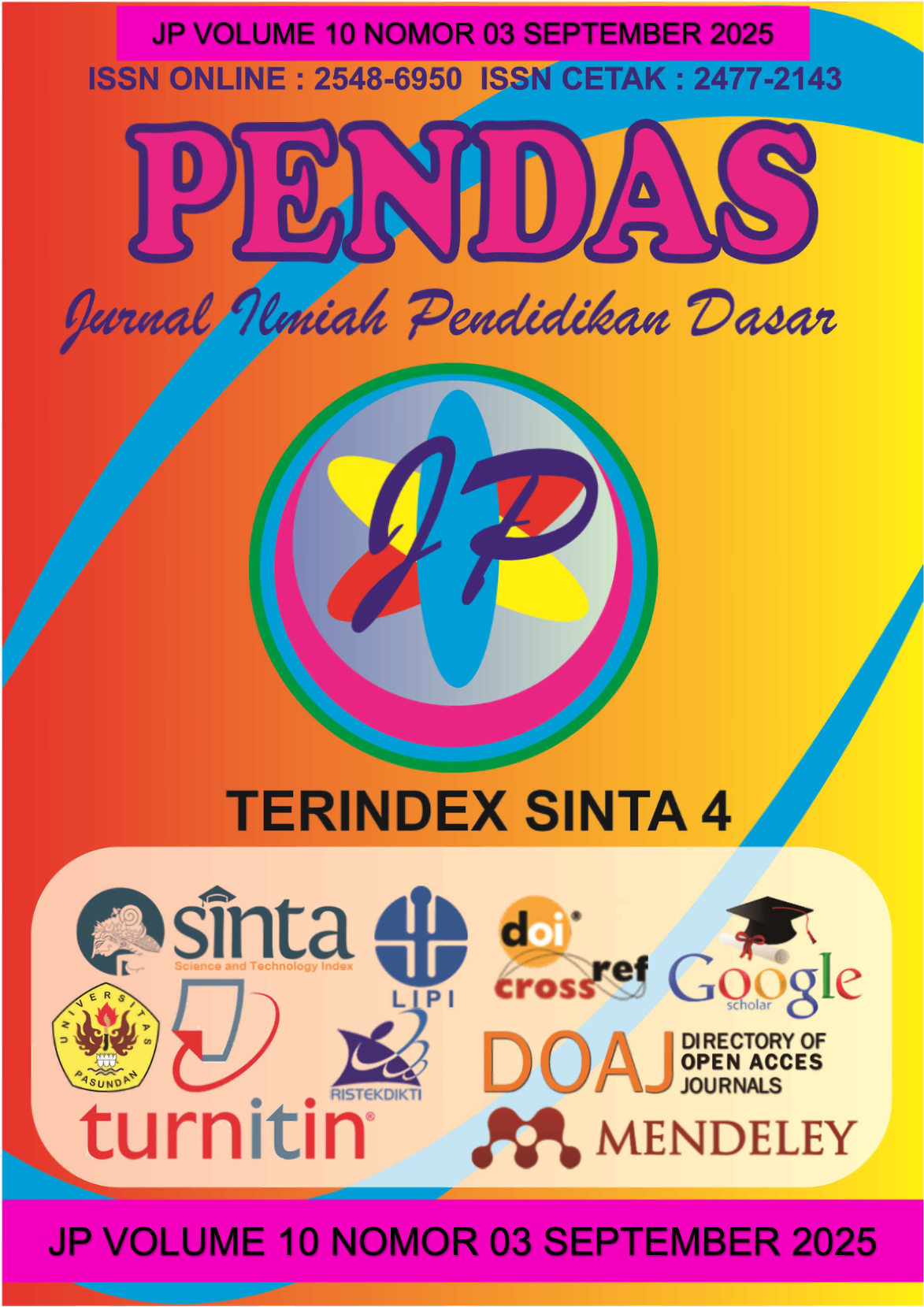SUPERVISI AKADEMIK KEPALA SEKOLAH UNTUK MENINGKATKAN KOMPETENSI GURU SMA DI SMA IT CORDOVA 3 TANGERANG
DOI:
https://doi.org/10.23969/jp.v10i03.30185Keywords:
Academic supervision, teacher competence, principal, professional development, integrated Islamic school, secondary education.Abstract
This study aims to provide an in-depth description of the academic supervision process carried out by the principal in an effort to improve teacher competence at SMA IT Cordova 3 Tangerang. Using a qualitative approach with a case study method, this research highlights four main aspects of academic supervision: planning, implementation, evaluation, and follow-up. Data were collected through interviews, observations, and document analysis, and were thematically analyzed using triangulation techniques.
The results of the study show that the supervision planning was systematically designed and oriented toward teachers’ needs, although there were still challenges in explicitly integrating spiritual aspects and the integrated Islamic context. The implementation of supervision reflected a reflective and dialogical approach, although it has not been fully optimized in the use of technology and differentiation of approaches based on teachers’ characteristics. Evaluation was conducted participatively, but has not yet fully impacted practice changes due to limitations in systematic reflection and follow-up. The follow-up of supervision, although not yet fully structured, has begun to be directed toward community-based professional development strategies and the individual needs of teachers.
This study concludes that the effectiveness of academic supervision is greatly influenced by the principal’s leadership quality as a learning facilitator and professional coach. These findings are expected to serve as a reference in developing a contextual, humanistic, and transformative model of academic supervision in integrated Islamic schools.
Keywords: Academic supervision, teacher competence, principal, professional development, integrated Islamic school, secondary education.
Downloads
References
Beach, D. M., & Reinhartz, J. (2000). Supervisory Leadership: Focus on Instruction. Wadsworth Publishing.
Borko, H. (2004). Professional development and teacher learning: Mapping the terrain. Educational Researcher, 33(8), 3–15.
Burhanuddin, & Ibrahim, A. (2020). Manajemen Supervisi Akademik. Jakarta: Bumi Aksara.
Creswell, J. W. (2016). Research Design: Qualitative, Quantitative, and Mixed Methods Approaches (4th ed.). Sage Publications.
Danielson, C. (2007). Enhancing Professional Practice: A Framework for Teaching (2nd ed.). ASCD.
Darling-Hammond, L., & McLaughlin, M. W. (1995). Policies that support professional development in an era of reform. Phi Delta Kappan, 76(8), 597–604.
Desimone, L. M. (2009). Improving impact studies of teachers’ professional development: Toward better conceptualizations and measures. Educational Researcher, 38(3), 181–199.
DuFour, R., DuFour, R., Eaker, R., & Many, T. (2008). Learning by Doing: A Handbook for Professional Learning Communities at Work. Solution Tree.
Dweck, C. S. (2006). Mindset: The New Psychology of Success. Random House.
Fernandez, C., & Yoshida, M. (2004). Lesson Study: A Japanese Approach to Improving Mathematics Teaching and Learning. Lawrence Erlbaum Associates.
Garman, N. (1982). The clinical approach to supervision. In T. J. Sergiovanni (Ed.), Supervision of Teaching (pp. 35–52). ASCD.
Glatthorn, A. A. (1997). Differentiated Supervision. ASCD.
Glickman, C. D., Gordon, S. P., & Ross-Gordon, J. M. (2018). Supervision and Instructional Leadership: A Developmental Approach (10th ed.). Pearson.
Hallinger, P. (2003). Leading educational change: Reflections on the practice of instructional and transformational leadership. Cambridge Journal of Education, 33(3), 329–351.
Heifetz, R. A., & Laurie, D. L. (1997). The work of leadership. Harvard Business Review, 75(1), 124–134.
Joyce, B., & Showers, B. (2002). Student Achievement through Staff Development (3rd ed.). ASCD.
Korthagen, F. A. J., Kessels, J., Koster, B., Lagerwerf, B., & Wubbels, T. (2001). Linking Practice and Theory: The Pedagogy of Realistic Teacher Education. Lawrence Erlbaum Associates.
Lave, J., & Wenger, E. (1991). Situated Learning: Legitimate Peripheral Participation. Cambridge University Press.
Leithwood, K., & Jantzi, D. (2005). A review of transformational school leadership research 1996–2005. Leadership and Policy in Schools, 4(3), 177–199.
Munby, S., & Fullan, M. (2016). Inside-out and downside-up: How leading from the middle has the power to transform education systems. Education Development Trust.
Nolan, J. F., & Hoover, L. A. (2011). Teacher Supervision and Evaluation: Theory into Practice. Wiley.
Sagalah, S. (2013). Konsep dan Makna Pembelajaran. Bandung: Alfabeta.
Sallis, E. (2012). Total Quality Management in Education (3rd ed.). Routledge.
Schön, D. A. (1983). The Reflective Practitioner: How Professionals Think in Action. Basic Books.
Senge, P. M. (2006). The Fifth Discipline: The Art and Practice of the Learning Organization. Doubleday.
Sparks, D., & Hirsh, S. (1997). A New Vision for Staff Development. National Staff Development Council.
Stiggins, R. J. (2002). Assessment crisis: The absence of assessment for learning. Phi Delta Kappan, 83(10), 758–765.
Yin, R. K. (2018). Case Study Research and Applications: Design and Methods (6th ed.). Sage Publications.
York-Barr, J., Sommers, W. A., Ghere, G. S., & Montie, J. (2006). Reflective Practice to Improve Schools: An Action Guide for Educators. Corwin Press.
Zepeda, S. J. (2012). The Principal as Instructional Leader: A Practical Handbook. Eye On Education.
Zuhairini, dkk. (2008). Filsafat Pendidikan Islam. Jakarta: Bumi Aksara.
Downloads
Published
Issue
Section
License
Copyright (c) 2025 Pendas : Jurnal Ilmiah Pendidikan Dasar

This work is licensed under a Creative Commons Attribution 4.0 International License.



















